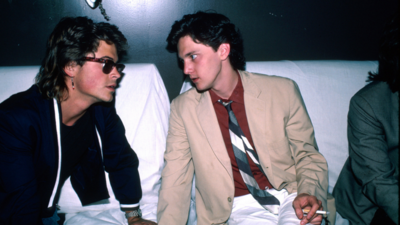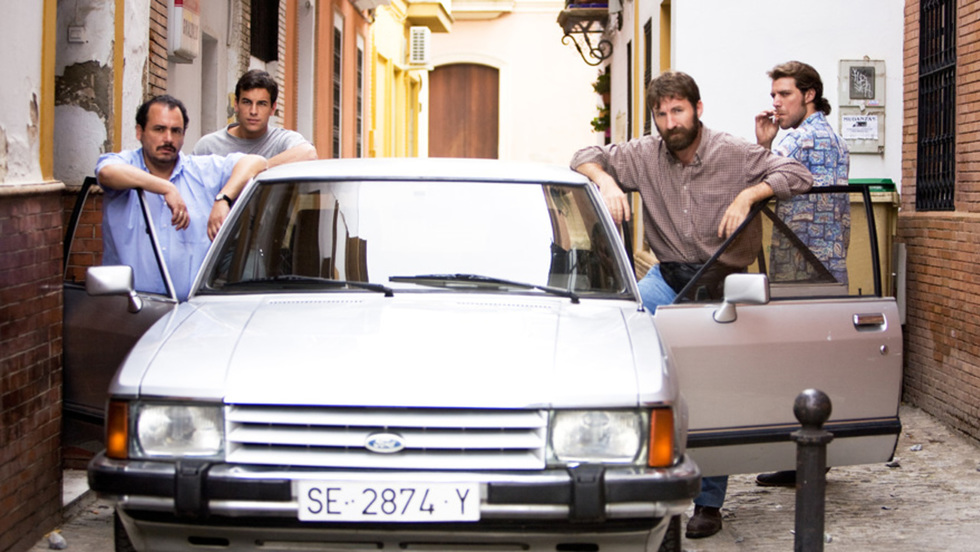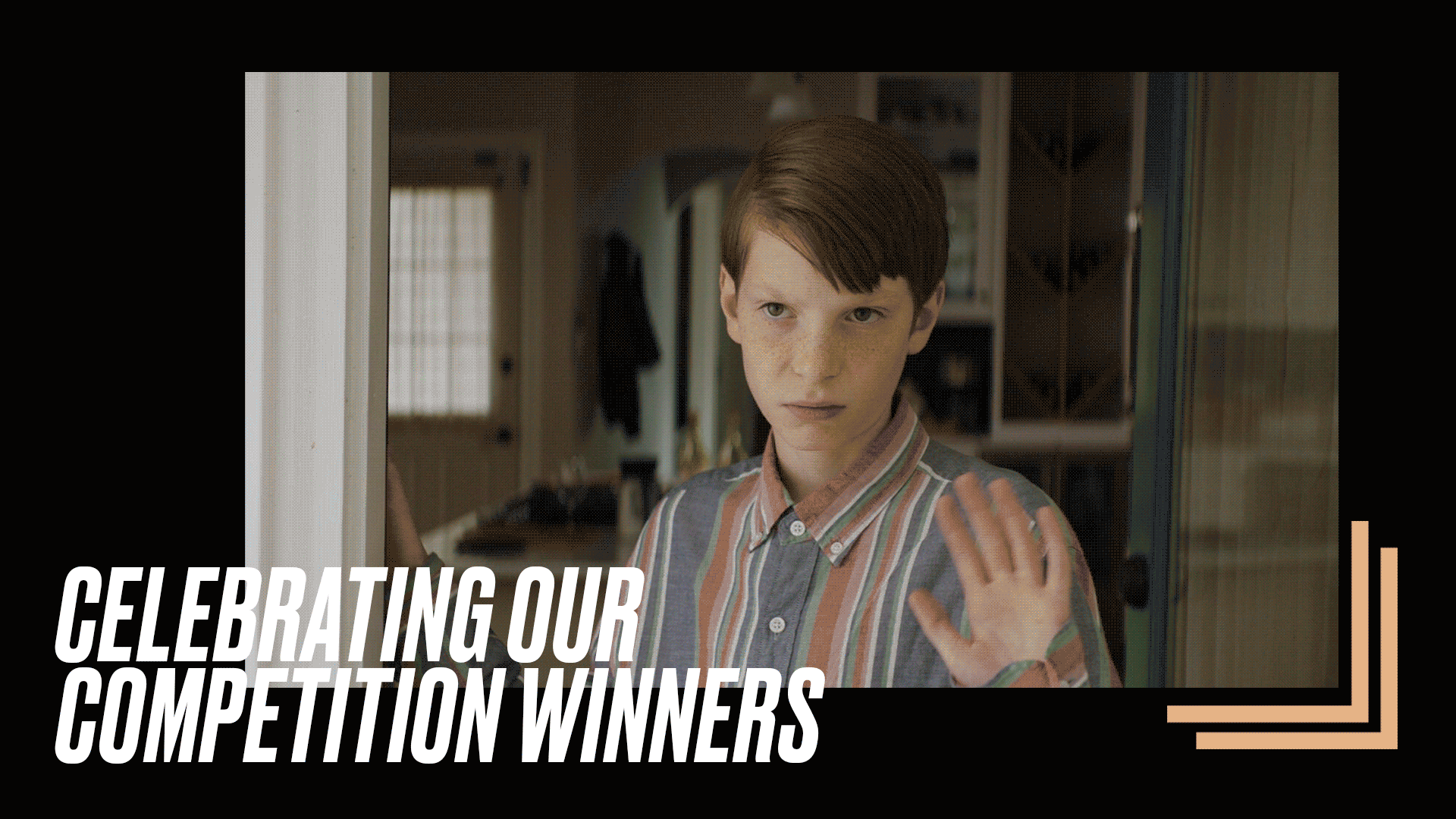
BY KAREN KEMMERLE |
Bad Guys Sometimes Have Badges
Spanish director Alberto Rodriguez talks dirty cops and shooting on the streets of Seville in his latest film noir/cop thriller, Unit 7.

Tribeca: Tell us a little about Unit 7. How do you describe the movie in your own words?
Alberto Rodriguez: UNIT 7 is a film noir, a cop thriller. A film that could be interpreted as the rise and fall of a band of gangsters, with the only difference being that our gangsters are on the “lawful” side of the line. They carry a badge.
TRIBECA: This is your third collaboration with your co-screenwriter Rafael Cobos. What inspired you to make Unit 7? Did you research any particular police unit or certain events surrounding the 92 Seville Expo?
ALBERTO RODRIGUEZ: The idea for Unit 7 rises from some files on an 80s trial. A lawyer friend loaned them to Rafael Cobos. Everything was very vulgar, petty, too familiar: a micro-universe of crime shaded by abjection. Everyone involved had some kind of addiction: gambling, drugs, money, self-indulgence. We decided that the context would be great for a film. The years before 1992 were years of economic boom in Spain, years of splurging and waste—a developing country entering the first world and presenting its credentials internationally.
Yet, in the meantime, what were the trash collectors doing? What were those who had the most unpleasant jobs doing? That was the question. We were not interested in big corruption scandals. Addressing the issue from a more domestic perspective was more interesting. Sometimes, smaller stories explain big issues better.
TRIBECA: Unit 7 is an interesting blend of drama and intense action that is told from the point of view of a corrupt police force squad. How did you and Rafael find that balance between the narrative and action sequences?
ALBERTO RODRIGUEZ: By choosing this point of view, we were already taking a risk. In this type of films, it is more common to be watching the action from an outsider’s point of view: a “good” cop who is a friend, a good “prosecutor” who is investigating the case, a journalist who wants to uncover them, etc. From the start, we thought that in order for the spectator to be able to go hand in hand with the characters, they would have to be believable, full of contradictions, very human. I don’t believe anybody is either good or bad.
There is always an underlying explanation for what people do. The challenge was to have the spectator feeling these contradictions. We found the balance in shooting actions scenes that made the characters grow. The characters are telling us about themselves by what they do and that way the action is integrated into the story. That is, at least, our intention.
TRIBECA: As the director, can you discuss how you planned the first elaborate chase sequence that took place all around Seville?
ALBERTO RODRIGUEZ: The first chase sequence was a lot of work, because it was shot in seven or eight different locations and everything had to fit in very well. Seville has changed a lot in the past 20 years, and if a given location was valid at one point, suddenly it was completely out of the question at a different point. This sequence was very complex. We were trying to show a part of the city that I find very beautiful. Seville has a very large historical center filled with low buildings and many artistic monuments, mainly churches and cathedrals.
We were trying to transmit this and to do it, we had to draw a very tight shooting plan and be very efficient when shooting. The shooting was also very demanding for the entire crew because there was a terrible heat wave with temperatures no lower than 104 degrees. I remember the actors running up and down… it was like a marathon for all of us.

TRIBECA: The cinematography in Unit 7 is extremely striking, especially during the complicated chases and violent action sequences. How did you did work with Alex Catalán to achieve the look of the film?
ALBERTO RODRIGUEZ: It was crucial to me for action scenes to look and feel real. Unit 7 had to be a realistic film—situations that could be identified with real behavior. This helps the audience enter a certain state of mind that, at times, can make them forget they are actually watching a movie. To this end, action scenes had to be in line with the type of film we were making. Personally, I don’t like movies where action, as in a bad musical, has little to do with the plot, with lots of effects that don’t really affect the characters. However, we had to keep in mind that a sense of spectacle was important in the film.
As for Alex, I have known him for almost 20 years and he has been the cinematographer in all my films. Alex Catalán’s work with the camera has been essential to create the amount of veracity we were looking for. The film had to have force. Alex has done a great job based on the needs of the film’s narrative structure without losing energy or freshness.
TRIBECA: You had a stellar ensemble cast, led by the great Antonio de la Torre and rising superstar Mario Casas. Can you tell us about the casting process?
ALBERTO RODRIGUEZ: I had seen all of Antonio’s previous works, and I wanted to work with him. Plus, he is from Seville! This is a very different role for Antonio because he speaks non-stop (seriously!) and the role of Rafael is very restrained. When I offered him the role, Antonio had not read the screenplay and still accepted right then and there. When he went through the screenplay and saw he didn’t have much text, he thought to himself: “Ah, well. This is probably just a small part.”
Mario Casas was suggested to me by the casting directors (Eva Leira and Yolanda Serrano) and my producer (José Antonio Félez). We sent Mario the screenplay and he really liked it, so I took a train from Seville to Madrid to meet him. We had a 2-hour talk and I realized that he had completely understood the character and what I was trying to convey.
The two other members of Unit 7 appeared after several try-out sessions. Joaquin Nuñez (Mateo) has extensive experience on stage, but this is his first feature film. On the set, occasionally, I would tell him: “You are not facing the camera, Joaquin.” And he’d go: “I forget I’m not on stage. Where is the damn camera?” As for Jose Manuel Poga (Miguel), he seemed to fit right in with the rest of the unit. The unit rehearsed together for a couple of weeks because we needed a real feel of cohesion and partnership, which I think we have accomplished. They actually have become friends in real life.
TRIBECA: Very little (or none?) of Unit 7 was shot in a studio. Were there particular challenges of shooting on location in Seville or in the surrounding areas? How difficult was it to recreate the Seville of twenty years ago?
ALBERTO RODRIGUEZ: In Unit 7, nothing was shot in a studio. Recreating the Seville of twenty years ago was not an easy task. We had a collection of photos from the years prior to the World Exhibition in 1992 that a friend kept. We actually recreated some of those photos exactly, like when Unit 7 is frisking the drug dealers while leaning against the wall of a church. Recreating a not-so-distant past is very difficult because it is hard to find clothing, decorations, etc. of the late 80s. I think our art team did an excellent job.
TRIBECA: What's the craziest thing (or "lightning strikes" moment) that happened during production?
ALBERTO RODRIGUEZ: Thinking back, probably the craziest thing was when we were doing some extra shooting for the ambulance chase and, out of nowhere, we saw a real police car following a car in a real chase, with a helicopter flying over our heads. Two chases taking place at the same time: a real one and a fictitious one. A second police car pulled up to our fake one and told us that we better remove the siren from the car or we could be shot if taken for real cops. Nothing happened.

TRIBECA: What are you most looking forward to at Tribeca?
ALBERTO RODRIGUEZ: On the one hand, I am looking forward to observing the direct reaction of a crowd that is not familiar at all with what Unit 7 is portraying. Also, I want to know if the film will succeed in other territories even though it is centered on Spanish events. Additionally, competing in Tribeca is a great honor. And, finally, I have never been to New York, and I am very excited about going there.
TRIBECA: If you could have dinner with any filmmaker (alive or dead), who would it be?
ALBERTO RODRIGUEZ: Possibly Luis Buñuel, if he rose from his tomb, as he wrote in his memoirs that he wanted to do. I think that Buñuel is the Spanish filmmaker that has portrayed Spain best. In my opinion, his films contain a great amount of the essence of what we are. He is a “master” in all respects.
TRIBECA: What’s your favorite New York movie?
ALBERTO RODRIGUEZ: Probably Manhattan. Visually, is it superb, and as a comedy, it is perfect. As I said before, I have never been to New York before, and the idea I have of the city is greatly influenced by this film.
TRIBECA: What would your biopic be called?
ALBERTO RODRIGUEZ: I’m not sure at this point in my life, but I think that I am a very lucky and very normal person (then again, isn’t that what most of us think of ourselves?). So, it would have to be something that reflects both things. I’m not sure, maybe A Lucky Man. I think that someone else already used that title, right?
TRIBECA: What makes UNIT 7 a Tribeca must-see?
ALBERTO RODRIGUEZ: That is more up to the audience. But I would mention the historical moment my country was undergoing. Many people have told me that they find that the film talks about how Spain believed it was something that it wasn’t.

Alberto Rodriguez made his feature debut in 2000 as co-director of the comedy The Pilgrim Factor. His first solo film was The Suit in 2002, and his 2005 film 7 Virgins earned him greater critical and commercial acclaim, as well as six Goya Award nominations. His 2009 film After was nominated for three Goyas.

